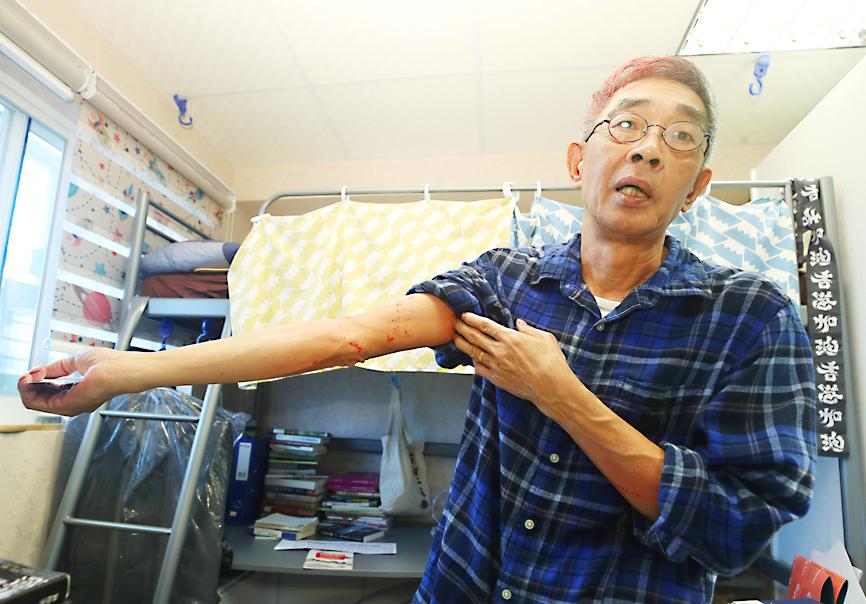Police in Kaohsiung yesterday arrested three men suspected of being involved in an attack on a Hong Kong bookseller in Taipei the previous day.
Lam Wing-kei (林榮基), a co-owner of Hong Kong’s Causeway Bay Books (銅鑼灣書店), who fled to Taiwan over fear of Chinese persecution, had red paint thrown on him on Tuesday morning by a man at a coffee shop in Taipei’s Zhongshan District (中山), just as his new bookshop in the city is set to open on Saturday.
The man fled the scene on foot, said Lam, who immediately notified the police, adding that he believed the attack was related to the new bookstore’s opening.

Photo: CNA
Early yesterday, police arrested two suspects — one man, 27, who allegedly carried out the attack, and another, 51, who is believed to have given the order. A third suspect was apprehended later in the day.
The three men, all residents of Kaohsiung, traveled to Taipei on Monday, the day before the attack, leading the police to think it was premeditated.
The incident occurred one day after Lam received a letter from a lawyer representing a bookstore in New Taipei City.
The firm accused Lam of registering a similar name to compete unfairly in the same line of business, while also infringing on its trademark, he said on Monday.
“I didn’t expect them to register and open another fake store in Taiwan,” he said, implying that the competitor is a front for Chinese authorities.
The Department of Commerce’s business registry Web site showed that the New Taipei City store is represented by a man named Chiang Tung-chan (蔣東展) and has a capital investment of NT$50,000.
The company, which does not have an English name, was registered on March 3 in Jhonghe District (中和), the registry showed.
Lam’s store was officially registered on March 31, with the English name “Causeway Bay Books Ltd,” and a Chinese name that is almost identical to the one in New Taipei City, except that it has the characters “Zhongshan” (中山) at the front of the registered name.
Lam said that his lawyer is dealing with the matter, and that he still plans to open his store in Taipei on Saturday.
Lam was one of five shareholders and staff at Causeway Bay Books in Hong Kong, which sold gossip-filled books about China’s leaders.
He disappeared into Chinese custody at the end of 2015, and was released on bail and allowed to return to Hong Kong in June 2016 to retrieve a hard drive listing the bookstore’s customers.
Instead, he jumped bail and went public.

NATIONAL SECURITY THREAT: An official said that Guan Guan’s comments had gone beyond the threshold of free speech, as she advocated for the destruction of the ROC China-born media influencer Guan Guan’s (關關) residency permit has been revoked for repeatedly posting pro-China content that threatens national security, the National Immigration Agency said yesterday. Guan Guan has said many controversial things in her videos posted to Douyin (抖音), including “the red flag will soon be painted all over Taiwan” and “Taiwan is an inseparable part of China,” while expressing hope for expedited “reunification.” The agency received multiple reports alleging that Guan Guan had advocated for armed reunification last year. After investigating, the agency last month issued a notice requiring her to appear and account for her actions. Guan Guan appeared as required,

A strong cold air mass is expected to arrive tonight, bringing a change in weather and a drop in temperature, the Central Weather Administration (CWA) said. The coldest time would be early on Thursday morning, with temperatures in some areas dipping as low as 8°C, it said. Daytime highs yesterday were 22°C to 24°C in northern and eastern Taiwan, and about 25°C to 28°C in the central and southern regions, it said. However, nighttime lows would dip to about 15°C to 16°C in central and northern Taiwan as well as the northeast, and 17°C to 19°C elsewhere, it said. Tropical Storm Nokaen, currently

‘NATO-PLUS’: ‘Our strategic partners in the Indo-Pacific are facing increasing aggression by the Chinese Communist Party,’ US Representative Rob Wittman said The US House of Representatives on Monday released its version of the Consolidated Appropriations Act, which includes US$1.15 billion to support security cooperation with Taiwan. The omnibus act, covering US$1.2 trillion of spending, allocates US$1 billion for the Taiwan Security Cooperation Initiative, as well as US$150 million for the replacement of defense articles and reimbursement of defense services provided to Taiwan. The fund allocations were based on the US National Defense Authorization Act for fiscal 2026 that was passed by the US Congress last month and authorized up to US$1 billion to the US Defense Security Cooperation Agency in support of the

PAPERS, PLEASE: The gang exploited the high value of the passports, selling them at inflated prices to Chinese buyers, who would treat them as ‘invisibility cloaks’ The Yilan District Court has handed four members of a syndicate prison terms ranging from one year and two months to two years and two months for their involvement in a scheme to purchase Taiwanese passports and resell them abroad at a massive markup. A Chinese human smuggling syndicate purchased Taiwanese passports through local criminal networks, exploiting the passports’ visa-free travel privileges to turn a profit of more than 20 times the original price, the court said. Such criminal organizations enable people to impersonate Taiwanese when entering and exiting Taiwan and other countries, undermining social order and the credibility of the nation’s